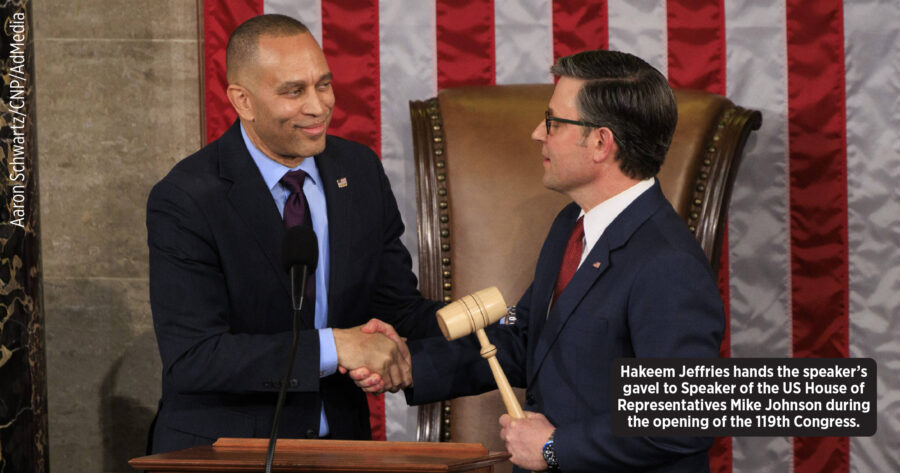HNW clients take center stage under Trump

Advisors in the high net worth space are doing much more than maintenance with clients in 2025. Or at least they should be.
With President Donald Trump back in power, literally everything is on the table when it comes to tax cuts, new laws, repealing laws and or favorable regulation. The Trump administration efficiency assessment of the federal government was well underway as this issue went to press.
The new administration delivered bombshell results on a near-daily basis and high net worth clients are the clear winners of the overall strategy.
With department heads and key lieutenants still being confirmed into March, much of the Trump administration blueprint remains under wraps. The first major showdown over the federal budget came with a mid-March deadline and will impact everything to come.
What is known is that Trump and Republicans who control the House of Representatives and the Senate are all in agreement on another round of tax cuts with a likely price tag in the trillions. Trump is eager to extend and build on his signature accomplishment: The Tax Cuts and Jobs Act of 2017.
The TCJA was the most significant tax reform since the Tax Reform Act of 1986, which lowered the top tax rate for ordinary income from 50% to 28% and raised the bottom tax rate from 11% to 15%.
But unlike the 1986 tax bill, the TCJA changes were limited to a decade. Congress chose to make the individual provisions temporary to limit the 10-year revenue cost of the TCJA to the amount authorized in the Congressional Budget Resolution ($1.5 trillion).
Also, lawmakers had to comply with Senate budget rules under the process used to pass the tax act and bypass the Senate filibuster, which required no increase in the federal budget deficit after the 10th year.
In short, Congress needs to act to extend the TCJA, and that creates an opening to cut taxes further.
“We must make permanent the 2017 Tax Cuts and Jobs Act and implement new pro-growth policies to reduce the tax burden on American manufacturers, service workers and seniors,” Treasury Secretary Scott Bessent told lawmakers during his confirmation hearing.
Extending the 2017 tax law “is the single most important issue of the day,” he added. Letting the law expire would unleash a $4 trillion tax hike that could crush the U.S. economy, Bessent maintained.
The GOP blueprint
At press time, Republicans were working to advance a budget blueprint reflecting Trump’s desire to slash taxes and spending in tandem.
The plan provides for up to $4.5 trillion in tax cuts and a $4 trillion increase in the debt limit so the U.S. can continue financing its bills. The budget plan also directs a variety of House committees to cut spending by at least $1.5 trillion while stating that the goal is to reduce spending by $2 trillion over 10 years, the Associated Press reported.
The tax cuts are being offset by massive potential cuts to social services, particularly Medicaid. Democrats naturally oppose tax cuts as handouts to “billionaire donors and wealthy corporations,” as House Speaker Hakeem Jeffries put it, but have few options to oppose the plan.
One important thing to watch for in the final package is whether the new round of tax cuts will be temporary or permanent.
Part and parcel with general tax cuts is the fate of the estate tax. The estate tax has long been a target of conservative lawmakers, who call it the “death tax.”
The TCJA more than doubled the maximum that families can give their beneficiaries without incurring federal gift or estate taxes. This applies to gifts made either while alive or as part of an estate.
The gift and estate tax exemption is adjusted annually for inflation and was $13.61 million for a single person in 2024. Unless Congress acts to extend the current language, the estate tax will revert to 2017 levels, or about $7 million.
As partner of Socium Advisors, Michelle Magner handles tax issues and many other financial concerns for high net worth clients. Socium is a national firm with plenty of resources, including a dedicated estate planning lawyer, to aid in financial planning.
“The tax management piece really impacts our clients in several different ways,” Magner said. “How we manage assets, how we’re planning for liquidation events, what types of strategies we can implement throughout a particular tax year to help or alleviate the burden. But then there’s also the longer-term piece of the estate tax and the types of insurance products that can really help to minimize or mitigate that tax liability in the end.”
Interest rates a big key
The insurance industry was among the biggest beneficiaries of the TCJA. The corporate tax rate reduction from 35% to 21%, a part of the act that was already made permanent, was a major benefit for insurers, as it directly boosted their after-tax profits.
Companies like Allstate, Chubb and UnitedHealth experienced higher profitability since they retain much of their earnings in taxable investments. Higher earnings allow those insurers to return more to shareholders, but also invest in much-needed technology like artificial intelligence tools.
But interest rates are a second key part of that profitability equation. Insurers, and high net worth investors, make money when interest rates are higher.
On that issue, Trump has been stymied by Federal Reserve Chair Jerome Powell. The central bank doesn’t “need to be in a hurry” to resume its interest rate cutting campaign, Powell has said, noting officials reduced the rate significantly last year and the economy remains sturdy.
After hiking its key interest rate to a 23-year high of 5.25% to 5.5% in 2022 and 2023 to tame a pandemic-induced inflation surge, the Fed cut the rate by a full percentage point by late in 2024, citing slowing consumer price increases.
The inflation rate edged up early in 2025, which makes the interest rate hikes Trump and wealthy investors want more unlikely in the short term.
Go private
Private placement life insurance is an option that can make sense for high net worth clients in a scenario of swirling uncertainty, said Michael Ashley Schulman, partner at and chief investment officer for Running Point Capital Advisors, a multifamily office.
A PPLI policy is structured as a private contract between the insurer and the investor. This arrangement allows the investor to “wrap” a new bespoke investment portfolio within the life insurance policy, thereby delaying taxes on income and capital gain accumulation while potentially minimizing estate tax liability at the end, Schulman explained.
PPLI investments can include opportunities not available in traditional life insurance policies, such as private credit, real estate debt, hedge funds, private equity, insurance-directed funds and publicly traded securities.
PPLI is a strong tool for advisors in estate planning for wealthy clients, more so if stepped-up basis is eliminated at the federal level, Schulman said. It offers high net worth individuals “an efficient mechanism for wealth transfer in an evolving tax environment,” he said.
Stepped-up basis is a tax rule that adjusts the value of an inherited asset to its fair market value at the time of the original owner’s death.
“By combining the tax advantages of life insurance with customized investment flexibility, PPLI provides sophisticated investors a powerful tool for long-term tax optimization while maintaining access to investment growth through policy loans, removal of basis, and other permitted features,” Schulman said.
Sen. Ron Wyden, D-Ore., is a relentless critic of PPLI. He introduced a bill in December to reclassify and tax the strategy.
A year ago, Wyden released a report calling PPLI a tax shelter for the ultra-wealthy. The report, which characterizes PPLI as a “buy, borrow, die” tax shelter, is highly critical of the uses and tax advantages afforded to the purchasers of such products that are not available to the less affluent.
With Republicans in full control of the federal government, PPLI appears safe from further regulation for the time being.
Micro-captive plans
Van Carlson is the founder and chief executive officer of SRA 831(b) Admin, an Eagle, Idaho-based firm that helps high net worth clients set up micro-captive insurance arrangements.
The micro-captive concept was introduced in 1986 under Section 831(b) of the Internal Revenue Code. Similar to how the 401(k) tax code allows an employer to set aside tax-deferred dollars for retirement, the 831(b) tax code allows a business to set aside tax-deferred dollars to cover under- or uninsured risks.
It can help a high net worth business owner eliminate a lot of risk and stress from their business, Carlson said. SRA is the largest manager of 831(b) plans in the country and began in 2008.
With the COVID-19 outbreak not long in the rearview mirror, many wealthy business owners know how quickly unexpected disruptions can arise, Carlson noted. The forced 2020 shutdown left many business owners fruitlessly appealing to their insurers for business interruption coverage.
“If you relied on PPP or ERC, or any government programs to keep your business afloat during those times, what are you doing differently about it today?” he said. “Because I don’t know if we can rely on the government next time, nor should we rely on the government next time.”
The IRS views micro-captive insurance arrangements with significant scrutiny, as some have been used for abusive tax avoidance schemes rather than legitimate risk management. That is just a reason for lawmakers to “clean it up” and make it a stronger and normal business practice, Carlson said.
The micro-captive concept is pretty simple. A business owner establishes a captive insurance company owned by the business or its affiliates. The captive provides insurance coverage for risks that may not be adequately covered by traditional insurance policies.
The operating business pays premiums to the captive, and captive insurers that collect $2.9 million or less in annual premiums (as of 2023) do not pay federal income taxes on premium income—only on investment income.
“You are retaining risk on your books, and you just don’t know it until something happens,” Carlson said. “And I think COVID-19 is a good example of that.”
InsuranceNewsNet Senior Editor John Hilton has covered business and other beats in more than 20 years of daily journalism. John may be reached at [email protected]. Follow him on Twitter @INNJohnH.









Hitting the accelerator on annuities — With Jackson National’s Alison Reed
Regulators tackle troubling illustration practices
Advisor News
- NAIFA: Financial professionals are essential to the success of Trump Accounts
- Changes, personalization impacting retirement plans for 2026
- Study asks: How do different generations approach retirement?
- LTC: A critical component of retirement planning
- Middle-class households face worsening cost pressures
More Advisor NewsAnnuity News
- Symetra Enhances Fixed Indexed Annuities, Introduces New Franklin Large Cap Value 15% ER Index
- Ancient Financial Launches as a Strategic Asset Management and Reinsurance Holding Company, Announces Agreement to Acquire F&G Life Re Ltd.
- FIAs are growing as the primary retirement planning tool
- Edward Wilson Joins SEDA, Bringing Deep Expertise in Risk Management, Derivatives Trading and Institutional Prime Brokerage
- Trademark Application for “INSPIRING YOUR FINANCIAL FUTURE” Filed by Great-West Life & Annuity Insurance Company: Great-West Life & Annuity Insurance Company
More Annuity NewsHealth/Employee Benefits News
- Genworth Financial taking the offensive after years of LTCi rate struggles
- Ambler Brook Announces Strategic Growth Investment in Claimify
- Sarepta Therapeutics Announces Commercial Launch of ELEVIDYS in Japan
- Howell, Watson propose bill to create oversight commission
- HEALTH INSURER FINANCIAL PERFORMANCE IN 2024
More Health/Employee Benefits NewsLife Insurance News